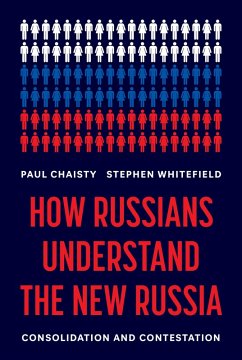What issues divide-and do not divide-Russian public opinion in the post-Soviet era The collapse of the Soviet Union in 1991 created a new Russia, with new territorial boundaries and new political and economic systems. The hybrid political economy that emerged incorporated commitments to markets and democracy that were undermined by the state's economic interventions and authoritarian restrictions. In this book, Paul Chaisty and Stephen Whitefield argue that the hybridity of the post-Soviet system provided a strong basis for the consolidation of Russian public opinion-and for the management of contestation so that it did not threaten the system itself. Drawing on almost thirty years of original public opinion research in Russia, Chaisty and Whitefield find that the territorial dimension of Russia's postcommunist transformation has disrupted public support for the hybrid political economy. In particular, they trace the reopening of system-level disagreement between system supporters and system opponents to the nationalist turn in Russia politics that culminated in the 2014 annexation of Crimea and the reactivation of Soviet identities. How Russians Understand the New Russia provides the first longitudinal study of Russian public opinion on the system of political and economic power that replaced communism. It offers unique insights into how Russian citizens have adapted their views of the new Russia, identifying the issues that are the most-and the least-divisive. Chaisty and Whitefield track Russian public opinion on a broad range of policy questions, discuss the political importance of both voting and not voting and consider problems of nation-building and national identity. Finally, they weigh the impact of the Ukraine war on Russia's hybrid system, and whether consolidation or further contestation is more likely.
Dieser Download kann aus rechtlichen Gründen nur mit Rechnungsadresse in A, D ausgeliefert werden.


